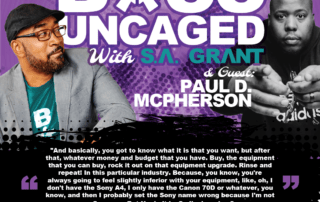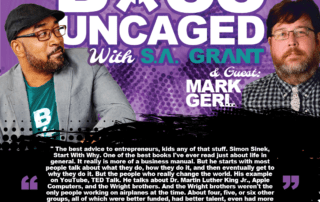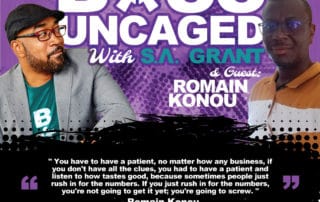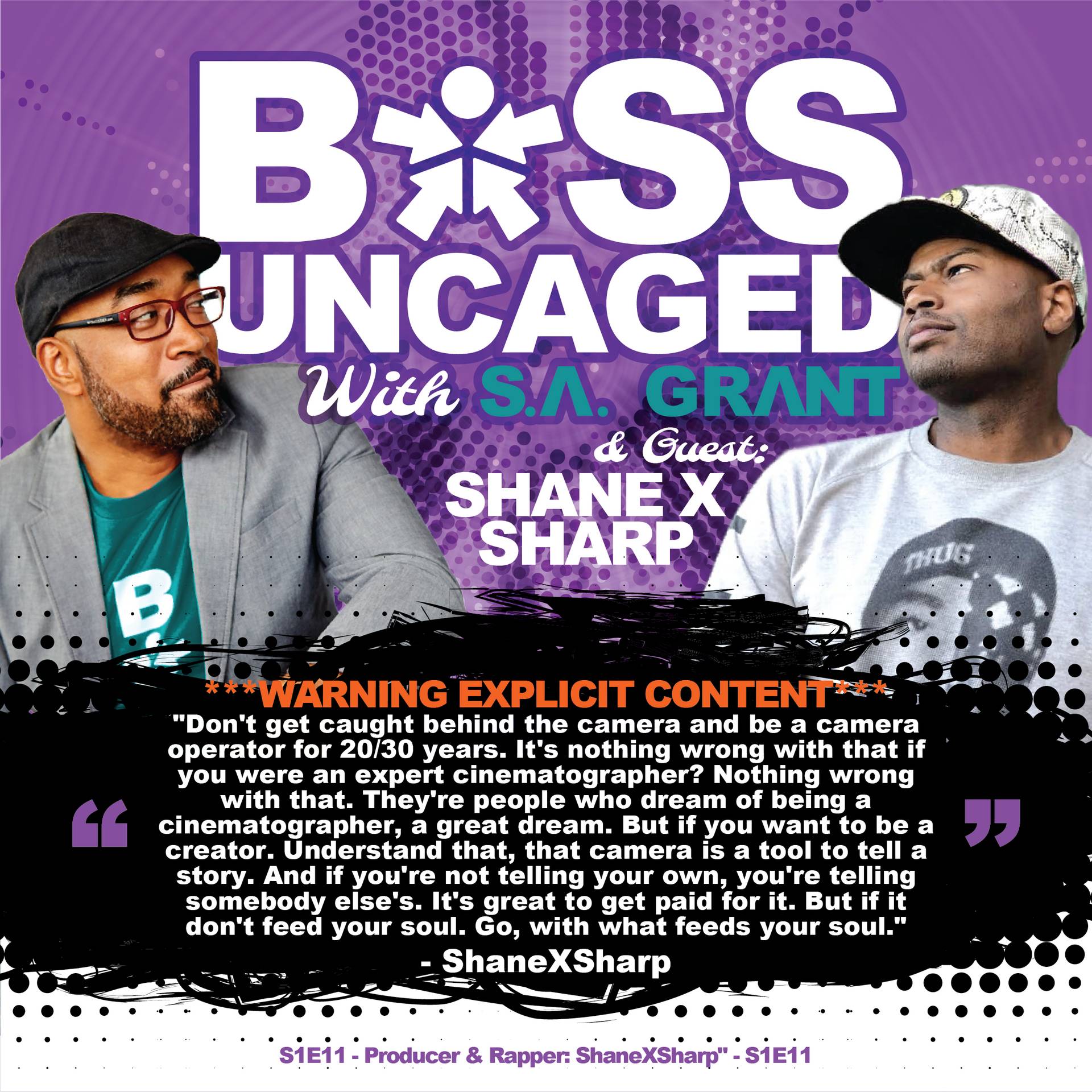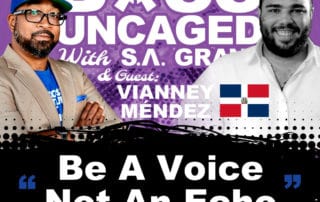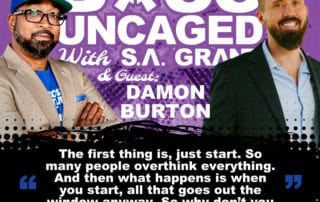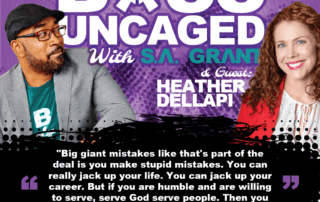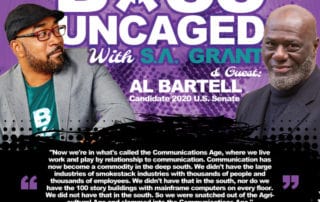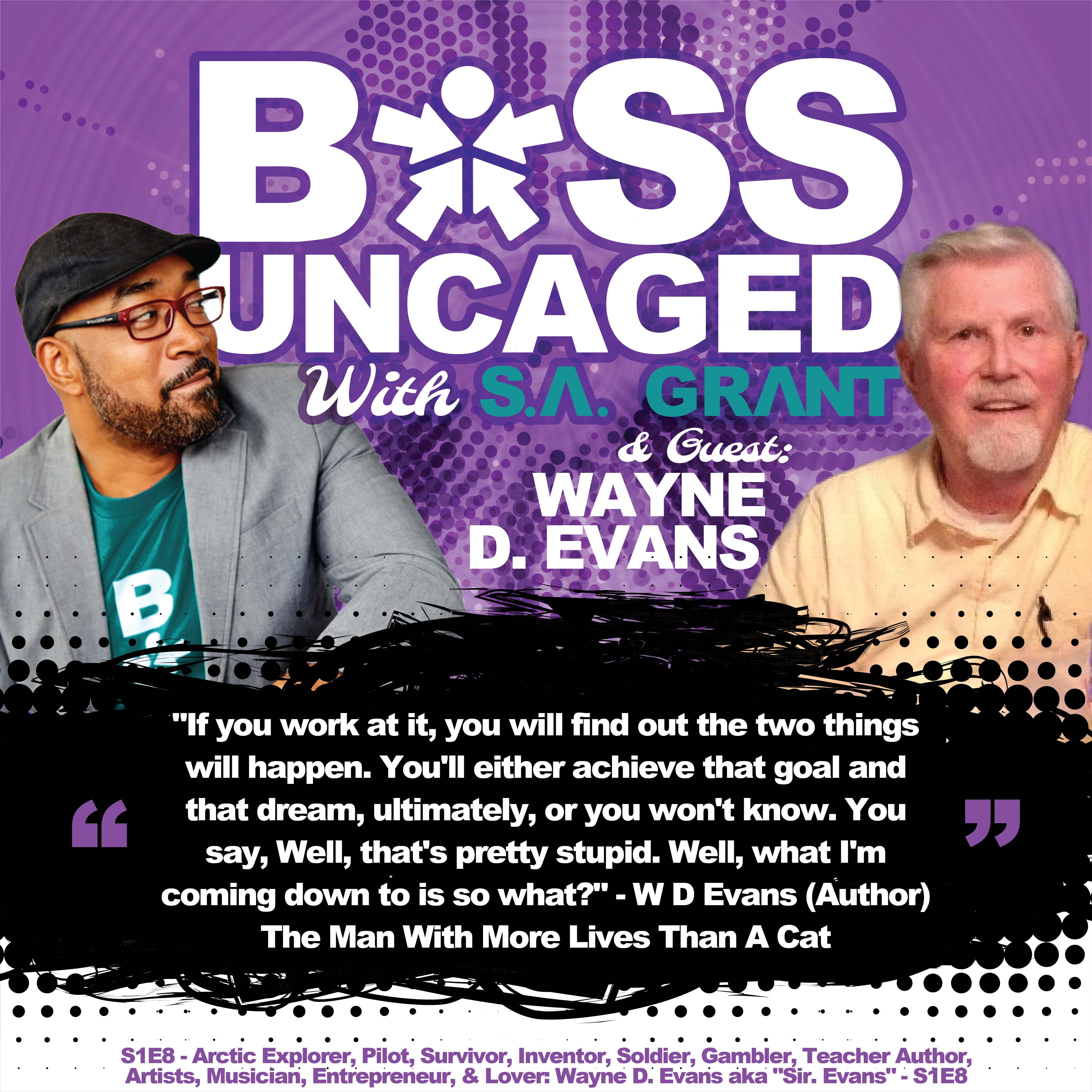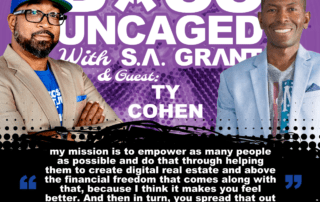Founder of Clique box & Professional Photographer: Paul D McPherson Jr aka “Biggie Pauls” – S1E14 (#14)
Boss Uncaged Podcast Overview
“And basically, you got to know what it is that you want, but after that, whatever money and budget that you have. Buy, the equipment that you can buy, rock it out on that equipment upgrade. Rinse and repeat! In this particular industry. Because, you know, you’re always going to feel slightly inferior with your equipment, like, oh, I don’t have the Sony A4, I only have the Canon 70D or whatever, you know, and then I probably set the Sony name wrong because I’m not a Sony guy. But Noah, it is. So I’m learning.”
– Paul D McPherson
Welcome welcome back to the Boss Uncaged Podcast. On today’s show, we have Paul D. McPherson Jr., the Founder of Clique box & Professional Photographer better known as “Biggie Smalls”. Today, we discuss business scaling opportunities and uncovering hidden growth strategies. Let’s jump right in.
Boss Uncaged Podcast Transcript
S1E14 – Founder Of Clique Box & Professional Photographer: Paul D McPherson Jr aka “Biggie Pauls” – powered by Happy Scribe
And basically, you got to know what it is that you want, but after that, whatever money and budget that you have. Buy, the equipment that you can buy, rock it out on that equipment upgrade. Rinse and repeat! In this particular industry. Because, you know, you’re always going to feel slightly inferior with your equipment, like, oh, I don’t have the Sony A4, I only have the Canon 70D or whatever, you know, and then I probably set the Sony name wrong because I’m not a Sony guy. But Noah, it is. So I’m learning.
Boss Uncaged is a bi-weekly podcast that releases the origin stories of business owners as they become Uncage trailblazers, Unconventional thinkers, Untethered trendsetters and Unstoppable tycoons. We always hear about overnight success stories, never knowing that it took 20 years to become a reality. Our host S.A. Grant Conduct’s narrative accounts through the voices and stories behind uncaged bosses in each episode guest from a wide range of backgrounds sharing diverse business insights. Learn how to release your primal success through words of wisdom from inspirational entrepreneurs and industry experts as they depict who they are, how they juggle their work-life with family life, their successful habits, business expertise, tools and tips of their trade release. The Uncaged Boss Beast in you welcome our host S.A. Grant.
Welcome welcome back to the Boss Uncaged Podcast. On today’s show, we have Paul D. McPherson Jr., the Founder of Clique box & Professional Photographer better known as “Biggie Paul”. Today, we discuss business scaling opportunities and uncovering hidden growth strategies. Let’s jump right in. Welcome, Biggie Pauls. Welcome, welcome. Welcome back to the show S.A. Grand here. And welcome back to another episode of Boss Uncage today. I guess it’s kind of funny because he’s a photographer and he’s the first person I interviewed. It brought it an entire ensemble of equipment and gear and also a cameraman with him to shoot a podcast.
Noah. Noah.
Yes. I appreciate you, Noah. Today we got Paul McPherson, also better known as Biggie Paul, and I call him Paul Gozman. So how are you doing today, Paul?
I’m good. What’s up? Thanks for having me.
Pleasure. Pleasure, ma’am. I’m looking forward to the comedy that’s probably going to be unveiled throughout this show. So let’s give people a little taste of who you are,
a taste of who I am. Meaning,
who are you?
Well, I’m a man.
That’s very true.
I’m a husband. I’m a father figure. Yeah. My name is Paul from North Carolina. Yeah. I mean, I’m a photographer. I’m a creative. I run a studio here in Atlanta and being plus studio. When I say I run, I don’t own it. I’m not the owner. There’s a lot of things that I do there and there’s about three or four of us that have the same position. So we all run it. But, you know, people. What do you do? Well, I run a studio. I help run a studio because they don’t want all that, all the particulars. They’ll need all that.
So you guys going to learn about Paul? He’s probably the most modest person and probably going to ever have a show. Okay, so you do own a company, right? So why don’t you tell everybody about?
Yeah,
click back.
Have you talked about my own company?
Oh yeah. That’s what I’m saying.
So yeah. Yeah, I’m a photographer. Like I said, I’ve been photographing professionally I would say since 03 when I graduated, the artist of Atlanta came down to Atlanta and no one graduated in 03. And then from then I just shot professionally headshots, mostly events, things like that. About two years ago, I decided to open up or start a new business, which is related with photobooks, doing photobooks, and I call it the click box. CLI, QUE the click box, the photo booth for your click and yeah, we’re doing well. I think we could be doing better. But I also don’t advertise it much. I don’t advertise it like I could and should. So I’m doing well for what I’m doing as soon as I start advertising and going full on full tilt and I’m this slow that I would say I’m doing badly, but but I’m slow. I take what comes to me, but I don’t actively go get it.
Seems like you’re 100 percent referral base at this point, right?
100 percent.
100 percent. So define yourself in three to five words.
You I knew I was going to say that.
Yeah.
You told me tonight listen to the old podcast because I’m asking some different. I’m asking some different already.
Actually, three different questions.
Yes, but everybody gets that question.
Yeah, they do.
Describe yourself in three to five words.
That’s a good tactic. It’s not like you’re stalling to build up this answer.
Yeah, it is. It is pretty good. I think I’ll go with what I said earlier, you know, i am husband and i am father and creative.
OK,
and I know I said those in sentences, there’s more than three and five words, but husband, father, creative,
cool cool. So you telling me about that, you own click box, but then you also work for a studio. So what is the most bizarre experience that you’ve ever experienced in these environments while doing photography jobs?
Oh yeah, bizarre. So
I should think a little bit as it does.
It does. So I have a friend. Her name is Angela.
She’s a monster. The boss’s wife.
Yes, she’s definitely a boss. Yeah. Angela Marie. So she’s am and i am pm but working with her I photo assists for her and other people as well. But I photostat this with her and she had a client, Steve and Jocelyn Hernandez. And so that’s how I met Steve very first time through her working with her. And we’ve worked I don’t know, two or three times. And somehow steve eventually reaches out to me, say, hey, can you do this? Shoot it. Maybe he reached out to Angela first. She couldn’t do it. I don’t know how he called me direct, whatever. I’m like, yeah, sure, we can do the shoot. Whatever you want to do. He’s like, I want to do some body painting for one of my artists. I’m like, OK, cool. And you talk about just weird and out there like. The communication was very minimal, like to the point where I thought it was fake and it wasn’t going to happen, but they showed up like, OK, cool, and they just do this body and I do nude fine aren’t nude work all the time. But this was just just odd altogether. This Australian young woman artist, I believe she’s a rapper. Destiny, Diamonds, Diamond Destiny. I don’t really remember her name, but yeah. So it was just this, this and I was about to say find out it was just this body painting shoot that we did that was just fast, like no art direction. But we did it and was all right. It’s on my Instagram.
What is your Instagram?
Just my name. Paul McPherson Jr..
OK, now I’ve got to go and check and see what exactly happened on the set. Well,
yeah. I mean, you’re not going to see the stories. I didn’t master stories at the time, but you’ll see three posts on there.
What made you get into this business? I mean, obviously, I’ve known you long enough to know that you’ve kind of before art school, you were in a whole nother you would like in law
criminal justice.
Yeah. Yeah. So, like, how did you get from a criminal in criminal justice to being a fine art photographer?
that so straight out of high school ’96 when I graduated high school, North Carolina, Fayetteville, North Carolina, I went to college in Fayetteville State University and I went to school for free. A full ride, academic scholarship, and I didn’t know what I wanted to do.
What do you think, Abengoa?
I still am in banking, but yes, I was in the band in high school and then I played football when I went to college. It did not play football, but I was still in the band and going for free, but not knowing what I wanted to do. Made me try all sorts of majors. So when I was going to college, I don’t know how it is now, but when I was going to college, they had this catalogue book. And you look in the back of the catalogue and it’ll say this major, these are the courses you need to take this major. And I would do this also. OK, I want to be a history major. I’m going to do that for a semester, realizes a whole lot of writing papers, didn’t want to do that. So I was like, I do like science. I’m a biology major. I’m pretty good at science. I hate chemistry. That was a no go. But anyways, I ended up with criminal justice because by the time my junior year started, the only two majors that I could do follow and still graduate on time were criminal justice and political science. And political science is a lot more writing and papers than criminal justice was, I took criminal justice.
So how did the…
process of elimination.
So yeah. So how did the transition.
Sorry, it’s a long story. While in school, all the you have all the activities and things I’m in band and all that. I went to a fashion show on campus and noticed there was this little pit where there are some photographers there. The school photographer was there and this other girl, Alanis, was there. And I believe this is how I remember it. I believe I approached her after the fashion show was like, hey, you know, what is this that you’re doing? How are you doing it? And she said, oh, well, you know, I’m just here taking pictures for fun. If you want to, I’ll let you be in here with me next time. I’m like, OK, cool. So I got a camera. The very first one I did was a point and shoot. It basically was a glorified disposable camera. It was a Kodak winded up kind of game. Yeah. And I took some pretty good shots on that. And then that coupled with the credit cards before credit card companies were banned from college campuses. So the credit card company was on campus. I signed up, I got a credit card, went to Best Buy, bought an actual SLR camera and I SLR because I’m that old, but there were no DSLRs at the time
would define it. I mean, some people may not even understand what those abbreviations are.
SLR is single lens reflex type of camera. It’s the camera that most people typically see. It has interchangeable lenses. The mirror goes up and down. And so that’s the kind of camera that you can change the lens and have a long lens and shoot telephoto or have a wide wins lens and shoot wide. I got one of those like a kit with two different lenses on it and I just had that for a couple of years.
So what’s your favorite game? Where are you?
Well, I’m I’m a cannon guy Cannon. I started with a cannon rebel and really advertising has always worked on me. However simple or complex it is, I solely bought the Cannon Rebel because of Andre Agassi tennis. Those commercials, oh, OK, cool, what can Romney get? Oh, yeah, that’s the Andre Agassi Cameroun.
Look at that. Well, how did you. I mean you’re talking about like 20 years ago, right? So how do you tie those things together? Like, it was like no real Google search engine.
That’s all I’m saying. I went to the store and I saw the cameras and I was like,
oh, this is the marketing in the store. Had the picture.
Yeah, yeah. But I had also seen the commercials, you know, there on TV like there. But Nikon, I say Nikon when I’m finding out that it’s Nikon, but whatever Olympias was like.
Oh yeah, Kodak.
Yeah, I was like, yeah. I mean Kodak was film though. Well and Sony didn’t have this. Sony didn’t exist. Or if it did, it didn’t exist in cameras. It was a minister back then,
was it.
Yeah.
2000
Sony took over. They bought Minolta or they took it over. I don’t know which, but yeah, Sony got into the camera business from the company minolta.
I remember I think it was like 2000, 2001 when they had the digital cameras with the little CD drive.
Oh yeah, yeah, yeah, yeah, yeah. All that to say. So Alanis was like, yeah, you can come in here. And I said, cool, did that with a little plastic camera. Then I upgraded to a SLR camera for two years. On my last two years on campus I was just taking pictures, I started taking pictures more and more at the fashion shows there ended up being two fashion troops, one split from the other Illusions Modeling Club and Black c. Somehow I kind of gravitated to shooting more illusions and Alaniz started gravitating to shooting black Millennium. People on campus were like, Oh, y’all are pitted. Like they pitted us against each other, like, but we’re friends the whole time.
We’re like texting and calling like know. So you need help with this or how do you do that. Like we’re all helping each other. And so that’s basically how I got into Kamras graduating. I thought I knew all the things like I was taking pictures of their coming out, good people doing little photo sessions with me. But yeah, I just thought I was shit, really. In Fayetteville, North Carolina, taking pictures on railroad tracks. You know, after college, I took a year off. I worked at Wolf Camera in the mall and I was a substitute teacher and I started feeling Bumi a little bit. Bumi like I’m not doing I’m living at home still not doing anything I need to. Breakaway. How do I do that? You go back to school one more, go back to school for what? I’m really good at photography and do that and learn that more so I can get in the industry, really. So I applied to SCAD when I was just in Savannah, Rochester Institute of Technology, Florida A&M because they had a good photojournalism program and the Art Institute, but they are still in Philadelphia.
Hmm.
And I got accepted to all of them, but the Philadelphia school accepted me first. So I was probably about three weeks from going there when I realized, oh, there’s one in Atlanta. Atlanta is close to my home in Fayetteville. Let me go there because it’s just closer. If I need to get home faster, easier, not even the temperature thing. Like it’s cold in Philadelphia. I wasn’t even thinking that I was just about proximity to the house. And then are switching to Atlanta, like literally the first week of classes, I realized I knew nothing. I didn’t know about large format cameras. I mean, yes, I guess I had seen them, but didn’t know anything about them. Didn’t know nothing.
So how long was that like from the time that you started playing with the cameras? Until now, we always hear about the overnight success stories that take about 20 years to become reality. How long did it take you to go from point A to point B.?
I mean, extreme point is ninety eight, 97, 98, when I was in college, got that first SLR camera to now. Twenty, twenty. So that’s twenty two years.
Yeah, that’s a long time
as a long time. So in those 20 years, I have my degree in criminal justice from Fayetteville State University. I have my degree in photographic imaging from the Institute of Atlanta. And I have just experience working on sets with many different people, some really big sets, some really small ones.
So what would you do differently to speed up that process? I mean, because obviously in the beginning you were trying to search and trying to figure things out.So what would you do differently
aside from not knowing what I wanted to do and a lot of people don’t know. So when you don’t know what’s going to be hard to figure out, how do you get to the top quicker? Yeah, you got to know. First of all, you got to know that’s what you want to do. I want to be a podcaster. I want to be a graphic designer. I want to build cars, whatever the case, you got to know that. But once you do know that. A lot of people who have gone to the Art Institute will say that it was a big money, such as a for profit school. They will say that, however, they will also say the education was good, too.
I can concur that because I went there, I’ve had this conversation with somebody else as well to it. I think it’s more so building drones that make sense. You’re like in the hive and they give you your task and you know how to do your task. Well, yes, but you don’t know how to monetize that task whatsoever.
You don’t monetize it. You don’t know how to deviate from it.
Oh, no.
It’s just right here.
If you know how to press the buttons, you’re good. But the second you decide, I want to press the buttons and I want to do something else, and then you kind of get lost in translation and you have to kind of figure it out on your own. So definitely. So do you think it was beneficial that you went to school for what you do?
Yes, I’m I have to say, yes, as much of a student loan debt as I have right now. I’m still going to say yes because there’s a lot of things that I didn’t like. I said I thought I knew a whole bunch of stuff available state using that one camera with maybe two different lenses to go in there. No learning that so many other cameras. And then it was kind of dawn, if you will, of the digital age. So I didn’t know anything about Photoshop, I didn’t know I know anything. I had one class available state doing darkroom processing. Which was the very basic basic like old chemicals they didn’t process about, they didn’t recycle them out, flush them out really, and give you new stuff. Like I also worked at the school while I was going to school and just having that behind the scenes, knowledge and experience was like, oh, OK, this is what I need to do. This is how you do these kinds of things. So.
So from the business aspect of it, do you come from an entrepreneurial background? I mean, like, I think your dad was military,
but both my parents are military. And so I would say, no, I don’t come from entrepreneurial background. Both of my parents are military. My mom retired as a major in the U.S. Army. My dad retired as a command sergeant major in the U.S. Army. And to my knowledge, that’s all they did. And I didn’t end up in the military because I’m fat man. I know in that year after college that I was like feeling Bumi and not knowing what I was going to do. I actually did try. I went to a couple of recruiters are like, oh, well, you know, you need to lose some weight. My whole philosophy is like, I’m not going to go to boot camp and lose weight and lose weight. So but they’re like, no, we need you a certain weight first, because you you’re going to lose more weight and get you closer to what we need. But I would see people on base not looking like they’re in shape. But, you know, they’re also higher ups and they don’t have to do as much stuff anymore. I guess I don’t really know. But I did try. I looked into it a couple of different times and then just kind of edged out with age and weight. Cheese, aged, wheat. Yeah, yeah. It’s a good cheese. It’s not government cheese. It really could be. Oh yeah.
So how do you juggle your work life with your family life? I mean, I know you got a son now you’re married, but being a photographer potentially, that means that you probably down the road. Right.
We might need to talk to Tanya about that one. How do I do this? Sometimes very difficult because somebody we have a three and a half year old, so someone has got to be home with him. And if neither of us are there, then we’re paying for someone to be there, which means. I need to be making more or much more than I’m paying out or it doesn’t make sense, I just not do it. Or maybe it’s a possibility that I can bring him by being three and a half. He’s unpredictable. So sometimes an iPad will satisfy him and sometimes it won’t
put a camera in his hand.
I have done that, but it’s my real actual camera that I use, so I can’t leave it in his hand. I’ve placed it in his hand and helped him press the button. But yeah, we don’t have a toy camera yet. I guess I should get one.
Mm hmm.
But I don’t know if I want him to be a creative. It was my experience. I mean, I know do this podcast right now talking about
how to read it.
Yeah. But, you know, I don’t know. I feel like I want him to be engineer software. Somebody all
those are creatives.
Not necessarily. Some of them are very analytical.
Analytical comes with creativity.
Not everybody’s you know, you the analytical creative activity bit of me.
Yeah. I mean you gotta think about even like Steve Jobs, for example, Steve Jobs was both right. I mean, he was both analytical and creative.
Wow. I feel like it was more marketing and analytical
marketing is creative.
OK,
I mean, literally anybody you could think about it, you can name a million people and I can show you how they were creative and analytical. Anybody that made it to that particular level, that plateau, you have to be creative. I mean, Tesla, for example, Tesla wouldn’t exist if he didn’t bend the rules and become creative. Right. So it’s right. But don’t don’t know, shortchange it. Put the cameras in. Let him decide.
Yeah, I guess you’re right. You’re right. Let him decide.
What are your morning habits, your morning routines,
ho morning routines these days. If I am not having to do something early at the studio, Rowans waking me up or I’m getting up around the time that he’s waking up, which is around seven between seven and seven thirty. And again, if it’s a day that we don’t have anything going on, I always have some kind of computer work to do, process somebody files work on stuff to be put on my website or so. In that case, there’s nothing to do. We just kind of laze around the house a little bit early and then I’ll get on the computer doing some work. And he has a trampoline in front of the TV. He just watches TV and does a trampoline and then he gets tired of that on his own, comes over to buy me, brings his little workbook and a little pre-K kindergarten workbook. I guess that’s with the K and his little pre-K workbook over to me. And he has this little pencil. It’s like I want to write. I’m like, OK, well, that’s right. So then he’s writing and tracing letters, things like that. They don’t get tired of that and go back. Oh, he’s almost that monetary philosophy going on. Just let him dictate how he wants to do things. I mean, unless it’s TV all day, I will stop it at that point. I’ll stop the TV, you know, after an hour or so. And then just see what he does. And he’ll just start picking up some toys, he’s starting with that imaginative play now, which people say, does your child do such and such? No, he doesn’t. I mean, started to be started to worry. But no, he’s like picking up the toys and he’s like talking. It’s like, oh, yeah, I want you over here. It’s actually pretty cool.
So is that the routine every single morning? That’s pretty.
Pretty much. And if I have to go to work at the studio, I’m allowed to bring him. Jason, the owner, he’s worked with me a lot. He’s been very accommodating. And so I can bring Rohan and do a lot of the tasks I need to do at the studio. A lot of my task at the studio are at the computer, but also give tours. People are appreciative, not appreciative. They’re accommodating as well, but they can see it’s a kid and it kind of brings smiles on their faces. So I think it kind of helps the tours. He’s like our little studio kid.
Hey, guys, let’s take a quick break in here from today’s sponsor.
Support for Bosso engaged. And the following message comes from Cerebrally 360, Cerebrally 360, where your online strategies become offline. Reality Cerebrally 360 has over 20 plus years of successful marketing and unique brand development contacts. Örebro 360. When you need instructive online success strategies, learn more and www. Serebral 360.com
back to the show. How does that work for you as far as like I mean, having your own business, having to click box. Right, and then working for a studio. Is there a bridge between the two that they can piggyback and work for each other?
Yes. So we have a vendor list at the studio, mainly for weddings. Every now and then we got corporate events as well, but mainly for weddings. There’s a vendor list of all types of vendors for weddings, mainly caterers, photographers, videographers, photo booths, etc.. My click box is on their list. It is the number one option.
I do have three other options. I have three options on there. It’s a joke that I tell in the tour. They always ask, do you have any recommendations for this and that? Oh yeah, we do. We have a list and I usually show it to them on the computer. And I’ll say, well, here’s an example. Here are our caterers. And then I’ll scroll down and say, oh, well, here are photobooks. This one right here is really good. The first one right here, the click box. They’re really good. I know that. I know the owner. He’s a good company, though, OK? And they’re like really looking like serious. And I’m like I say, he’s also me. And that’s always the biggest laugh and joke. Oh, OK. Well, yeah, we need to reach out. So whether that’s ethical or not, I don’t know. I mean, I feel like it’s ethical because the other businesses are they’re they’re they’re on the list as well. I just say that this is mine.
It seems like it’s more sort of a partnership. Right. So it. And the partnership agreement.
Oh yeah. I mean, Jason doesn’t mind is there. Yeah. So his actual rule, his only one rule to it was it’s like you can’t be the only one.
Got it. So I mean, yes, it sounds like that owner, he understands the principles of not monopolizing the situation.
So just being fair, being followed. Life isn’t fair and business always isn’t fair.
But well,
just being having that
well you get to do the pitch.
So exactly. That’s where that’s where
that’s the loophole. Right. You get to pitch. So by default if you’re pitching you’re close and so.
Right.
Everybody else is kind of like unless you jack up that pitch.
Exactly.
That’s hilarious. So another question to have you with that is where do you want to be? Because, I mean, right now, like, you’re working in your field, right. And you have your own business and you’re partnering the two and you have some synergy going. But if you have to pick between them, which one would you ideally want to lean towards?
Well, you’re asking me, do I do work for someone else or do I work for me? Basically,
yeah. I mean, my particular viewer base are entrepreneurs or business owners. Right? Right. And so you’re like you’re in that middle of that class. But I think you’re kind of like one or the other is going to pull you sooner or later. Right. So right now you have one that’s kind of paying you on a routine basis and you have another one that you’re kind of playing with. But if the opportunity precedes itself, that one could potentially outweigh everything else that you’re doing currently,
that it’s true. So I am a independent contractor for the studio. Like, I’m not an employee. There’s no employees there. There’s the owner and the independent contractors. So basically, I’m a consultant for the studio that’s there a lot. And so if you look at it that way, they’re my biggest photography client, got about half my income is them. So I guess the point would be when the click box income rivals Ambiens income.
Well, I mean, if you staged it that way, and this is just me just trying to give you give me some gain. Go ahead. So my first question I’m going to ask you is, are they paying you or are they paying your company whose name is on the check?
The company.
So it’s going to your company’s not going to you. It’s a personal check.
Well, OK, so you’re about to get on me now for real. I don’t have I’m not an LLC as EZCORP, all that stuff. I’m a sole proprietor. So yes, it’s all one in the
same importance. Yeah, yeah, yeah.
OK, let me get my stuff together and then yes we’ll be paying the company the company pays me. But since I’m still a sole proprietorship it just all comes to me.
Yeah but I mean
even then I do my taxes I suppose, you know, do all that stuff you itemize out. Yeah.
But I’m just saying it from the viewpoint that you just gave me. You’re looking at it as more so as a B2B partnership. So you have to remove yourself from that equation and make it a B2B partnership that way. The other thing I will talk to you about is essentially you’re saying that you’re still doing some of the work, right?
Mm hmm.
Couldn’t you outsource some of that?
I could, but I don’t make enough money to outsource that one, to outsource some of it. If I’m understanding what you’re saying correctly, to get someone else to do some of the things that I do, I will have to pay them something.
Yeah,
but that’s money that I can’t almost 100 percent have myself right now is cheaper for me to do that. I need to do that.
Yes or no? Yes. It seemed like that because you’re getting the instant gratification of that money coming in. So for every one hour you work, you get 100 hours. But that’s one on one and that’s one hour of time that you have to put into it. Right. Versus if you do three hours worth of time and you pay three people fifty dollars an hour, then you make one hundred and fifty dollars and you keep multiplying. He multicam can multiply, you’ll have to pay him the full amount. He’s got to find somebody that’s willing to do the job for less than what you’re getting paid and that they’re satisfied with that. Then you find more people like them and you scale it that way. You’re not doing one job now. Now you’re doing five, six, 10, 12, 13, 14 jobs, you know, at the same rate or if not even more. And you’re eating off of all of my reading of 10 jobs at a 50 percent break, 10 times 50 is what you have.
Yeah.
So I’m just saying that if you want to look at it from a business standpoint and you’re going into that business, then I would say right now I think you’re at that point and I think you’re a great person to be on the show because I think you’re at that boiling point. OK, I’ve been doing this. I’ve been doing this, but making money and I’ve been building this and I have my own company. But how do I step away from it and scale it and not keep treading? You know, I’m saying you’re listening. The money quadrant right. The left side versus the right side.
Right.
And right now you’re on the left side.
Mm hmm. And I am actually, in the last two years able to do that, actually do what you’re saying, because in the photography, I can’t because people hire me for my for my I like oh, I love the way you shoot. I love how you got this detail. I love the headshots that you got for this. They love that. And I can’t go and give that to somebody else. I can’t no offense to. No, over here I can’t say hey, no, go shoot this thing for me because while he might do a good job shooting it, it’s not the same way I would have shot it. And the client may or may not like that. So there’s that. Whereas the click box, it is something you set up.
Oh yeah. And that’s very scalable.
So so I understand what you’re saying. I can do that. But I just started that really like I’ve been doing this photography and then I’m like, wait a minute, I can. Buy into this thing with some equipment and then start here, but it’s endless, the possibilities are endless. I could just go and this is the I actually just came back from Vegas a couple a week and a half ago. It was my third year going out there for a photo booth convention. I actually don’t believe I’ll go back next year unless I’m paid to. But it’s not something you need to go every year, basically. Some people do as a party aspect.
And I also say go every year. You’re going to meet somebody new every single time you go.
Yeah, you’re right. I’ve met some good other owners this year.
Yeah. It’s just the cost of doing business. Just look at it as it is. It is that
that’s all it is all itemized down to. Oh, shoot, I’m about to get in trouble
as he just sips on when we drink it, I want to say juice,
do say out of my Khanjar glasses. I don’t know what happened to Ludicrous and Khanjar, but I still have my autograph bottle so unopened. Anyways, as we digress to alcohol and no supposed been had this glass has been sitting here. Oh, yeah, he’s going to get that going.
So what do you see yourself in 20 years ideally
doing the same thing I’m doing now?
Smarter.
Yeah. I don’t want to have to get a job where I’m punching the clock and all of these things. I like being able to be hired to go and photograph and capture moments. I like going to various events, doing my photo booth. That’s about it. I mean, in 20 years, doing the same thing. Like I said, just less this. I mean, 20 years from now. So I’m old. I feel like I’m old. I’m 42. So in 20 years I’ll be 62. I don’t think I would like to be lugging equipment around here and there, but owning the company and like using that scalability. You’re talking about having people do that. And I’m just you know, I’m running the back in computer stuff and maybe the phone calls and emails, but I’m sending people out and they’re doing that. So basically just having a successful photography business and a photo booth business.
So what words of wisdom do you have for up and coming entrepreneurs that are following in your footsteps, photographers, people that want to start up their own photo booths, even possibly running a studio?
I mean, I guess that goes back to what you asked earlier. You said you asked me. What would you tell someone, what was the question, like you said, what information do they need to know to have them skip some steps or something to that effect? And basically, you’ve got to know what it is that you want. But after that, whatever money and budget that you have, buy the equipment that you can buy, rock it out on that equipment upgrade. Rinse and repeat in this particular industry, because, you know, you’re always going to feel slightly inferior with your equipment, like, oh, I don’t have the Sony A4, I only have the Canon 70 or whatever, you know, and then I probably set the Sony name wrong because I’m not a Sony guy. But no, it is. So I’m learning the five, Lemarque four. And I upgraded about two and a half, three years ago from the 70s. And the 70s was killing me every time I had an event or having to do anything with low light because it’s ISO doesn’t go up high enough. It gets well, it does go up high, just gets really grainy really fast.
If you don’t mind slipping. What is ISO?
I don’t know what it actually stands for. International. How does something
what does it do about what is a shot.
So basically you can change the value of the ISO. The lower that number, the tighter the grain, the more crisper your image looks, the higher that number, the more grain that you see in your image, the more like film grade it’ll start looking. And all of that is about what your level of acceptance is like. Oh, I like this. This is what I like. This is my style.
And your style is shooting at thirty two us a film grain.
Yeah. Yeah. That’s your style to shoot thirty two thousand two hundred iso or sixty four hundred a great do your thing. But not all things can be done that way. Yeah. Like one you don’t do head shots. Yeah. I want to say headshots. You don’t want it. Yeah. You don’t do headshots any higher than a certain iso
you make poor something like craters.
Exactly. Exactly. And so you can be in a low light situation. I get a I have a cigar bar as a client and that’s a very low light situation. So I crank up the ISO. It works in that situation because it gives you that mood,
that film noah
Yeah. Mhm. So it just depends on what it is that you’re looking for in your iso, but basically the lower that ISO, the tighter that grain, which also means you’ll have to open up. Oh so you don’t to me certain about starting to talk about shutter speed and aperture. But, but you need to understand iso shutter speed aperture and then fourth you’ll need to understand the speed of your lens. So if your lens as a 2.8 lens or as a one point four, one point two or even a five point six, like, you need to know the limitations of your lens. I guess a fifth thing would be your camera. No, it’s limitations. And then you manipulate all the photos with ISO shutter speed aperture.
It’s funny that you said that because the one thing that you would think from a photographer that they would mention thirty years ago would be film.
Yeah, we don’t need that a lot of the well because OK, so film the different types of film back then when they were using it in this film is still out there, but I don’t use it that much. But the types of film that you would use would give you the types of effect that you want. So for instance, I’m talking about Tigran Grain and no grain. Basically, I’m going to use a fifty speed or a 100 speed Porcher or Velva slide film. That’s really tight grain. That’s real crisp, looks real good. But, you know, from a shoot, something at night dark. Let me go ahead. Give me some of that. I don’t know. Ilford thirty 200 or kodak Tmax thirty two hundred or something like that. I’m only thinking goes higher.
So I think what you just did it, you just give so much value that you never realize it. You just explain the difference between having a digital camera and having film and the correlation between the numbers and the value of isos versus the speed of the film.
Right.
Which most people wouldn’t even be able to understand. What the hell you talking about? What you just paired the two together. It is like twenty years ago it was like this, but it’s like this now.So you’re your digital cameras because look at you, same effect essentially as film,
right? OK, yeah.
Yeah. Gotcha, gotcha. All right. So the other question I have for you is where can people find you? Facebook. Instagram?
I am. I’m Facebook and Instagram. I use Facebook. And you’re going to totally insert Nacho because I was concerned that yeah, I use Facebook more for family, friends. I don’t use it for business. I use Instagram for business
mix sense
and I have my website. So my website is www.Paul MacPherson.Com. My Instagram is Paul McPherson Jr.com was Paul McPherson Jr.. Not dotcom but Instagram handle. And you could find me. On Facebook, if you just search my name, Paul D McPherson Jr., and then you could also find Paul McPhearson photography. The fan page of the business page,
this transcription transcriptions coming really handy.
Yeah, yeah, that’s a transcription stuff. But let’s see on the transcriptions, like that’s what you would put and not very much. Oh, you’d be having these long 1500 word people,
one that’s 17000 words that I’m opposed to. You know, people want the detail.
They want the detail. Yeah, you’re right. So have that in the description. And then also my photo booth is the click-box TAT ,CLI QUE Box.Com, that’s the website and click box on Instagram. I think I have a Facebook. I don’t think I ever use it though.
Bonus question. Crazy man. All right. This is a bonus question and I got two of them. I don’t know, maybe we have to actually bolt. So one of them is if you could spend 24 hours with anybody uninterrupted, who would it be, dead or alive and, what,
24 hours uninterrupted? Would anyone be anybody
dead or alive?
I am a victim of recency bias, so I would probably say Kobe Bryant right now. I mean, that man is very or was very determined in all things, and I keep hearing these stories that are coming out now after his death and things like that. And I. I would like to sit down and talk to him for a while. Well, how did how did you do this and how did you do that? And, you know, you’re supposed to shut up and dribble, but yet you got an Oscar over here. You write in books professionally. Those questions personally. I mean, you’re this famous girl that I have a son, but you’re this famous dad. Talk to me about like. Tips give me some tips on how to do this or how to do that or just little things here and there again, and I know this about myself, so I’m definitely victim to recency bias. So I would that’s probably who I would say
Mr. Current events.
Yeah, yeah.
Another one would be if you could be a superhero, who would it be and why
not the superpowers. But what specific superhero.
Yeah, superhero. You could pick a power. I mean the power is an implementation of a superhero so,
I guess I do like superheroes. I do like the superhero movies.
That’s why I have to ask you about questions. I mean, I’m surprised you don’t get Star Wars right.
I was literally thinking like I feel like I’d like to be more Jedi ish than an actual superhero, but.
You got to tell people your obsession with Star Wars. I mean,
it’s it’s not it’s not an obsession. Well, yeah, maybe it is. It’s a hobby. It’s what I like. Some people like Pokémon, I don’t know.
But Disney buys Pokemon and then they start having Pokemon inside of you. Yes.
But no, I mean, I really like Star Wars. I like the stories. It’s traditional good versus evil kind of situation. Sometimes you feel for the evil like the entire. Skywalker saga is about feeling for the evil guy once you know the entire story, not the first three that were released, but once you know the first three and then the next. Within the last three, like, you’re like, oh, you know, especially when you’re watching the Clone Wars, which I just finished watching re watching like an obsession, Anakin Skywalker. Like, that’s the dude
he is.
I mean, he was great as a Jedi. He’s great as a Sith. Like there’s a podcast I listen to. They talk about the great Jedi and how he does the main guy. He doesn’t really like the concept of the great Jedi, but I’m notoriously in the middle a lot like politically. I’m kind of in the middle. So I’m probably more conservative, but I’m closer to the middle. And so I like the idea of being a Jedi, being, you know, if I’ll use a bad thing if I need to. But Main mainly a good soul.
So you just made up a whole new Jedi.
And it’s not new. It’s the thing.
It’s a new thing to the common audience. They’re like, what the hell is a great Jedi? Did I miss Episode 15? Like,
I would say a good character would be so Catano that she’s basically a great Jedi. They haven’t defined her as such.
Mm hmm.
But she’s basically that
great Jedi.
Mm hmm. So it’s not good, but I’ll do what I need to do. And Anakin was basically a great Jedi until he actually turned to the dark side
all the way through,
all the way through it, all the way. I wanted to save. Padman didn’t. Yeah. Yeah. Great.
Yeah. Well, I definitely appreciate you coming on the show a good time.
I really appreciate you having me again. I think I told you I was just like, I think I’m going to be the least successful person you interview, but sure, I’ll be here. Just let me know
it’s funny. I get these different things about people that I invite on the show and everyone’s like, I like the last show I recorded. He was a director of technology as a teacher. And he was like, I didn’t know why you weren’t going to show. And I’m like, well, guy, you’re influencing the next generation of the next entrepreneurs up and coming and your philosophies are going to roll over in twenty years. So, I mean, obviously everything that I’m doing has a reason behind it. And I think today’s show was more so giving you insight to your business and what you’re sleeping on and you have opportunity to grow and scale it if you just go ahead and do it.
You’re right. Yeah, that’s what we have not talked about this whole time, is I do have a bit of laziness in me and I know you know this and so sometimes lazy, just the laziness just wins. Like as long as I’m making my bills or doing this.
That’s that great gerrymanders. Yeah.
But yeah. So I know I just got to get the work, put my head down, do my work and look up about oh you don’t make money. Oh shoot. We got a new house. Oh shoot. Whatever, whatever, whatever. So get down grind look up and maybe enjoy a little bit. Get back down in grad
cool. Oh yeah.
Well OK. So I appreciate you. We’ve known each other for a long time so I appreciate you bringing me out. This is great for those people who don’t know Schnall or he says I say Grant s.A. Grant, he’s notoriously private. If you get inside his house you like in that that lucky few. And I like seeing your growth, sir.
Thanks for tuning in to another episode of BOSS UNCAGED, I hope you got some helpful insight and clarity to the diverse approach on your journey to becoming a trailblazer if this podcast helped you. Please email me about it. Submit additional questions. You would love to hear me ask our guests and or drop me your thoughts at ask S.A. Grant .com Post Comments share hit subscribe and remember to become a Boss Uncage you have to release your inner Beast S.A. Grant signing off.
Listeners of Boss Uncaged are invited to download a free copy of our host S.A. Grant’s insightful book, Become an Uncage Trailblazer. Learn how to release your primal success in 15 minutes a day. Download now at www.sagrant.com /boss uncaged.

